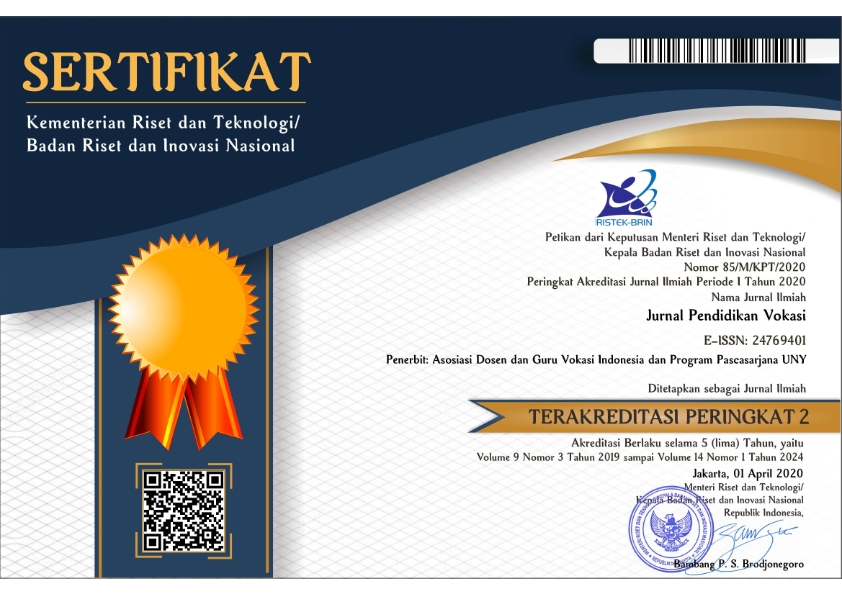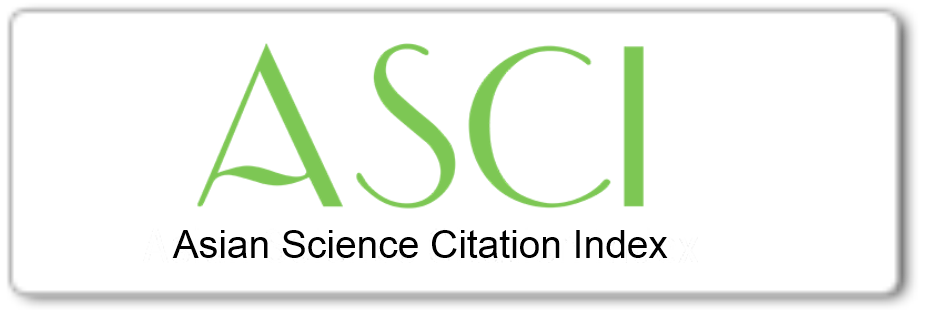National Standards of Education affect the employment opportunities of vocational high school graduates
Putri Ulfa Kamalia, Department of Economic Education, Universitas Negeri Surabaya, Indonesia
Abstract
Keywords
Full Text:
PDFReferences
Akkoyunlu, Buket. (2002). Educational Technology in Turkey: Past, Present and Future. Educational Media International, 39:2, 165-174.
Allejar, M. (2017). Pengaruh Implementasi Kebijakan Standar Proses Pendidikan terhadap Manajemen Kurikulum untuk Mewujudkan Efektivitas Pembelajaran. Khazanah Akademia, (Vol 1, No 01 (2017): Khazanah Akademia), 39–48. Retrieved from http://journal.uniga.ac.id/index.php/K/article/view/168
Apriana, Dina, Muhammad Kristiawan, Dessy Wardiah. (2019). Headmaster’s Competency In Preparing Vocational School Students For Entrepreneurship. International Journal of Scientific & Technology Research, 8 (08), 1316-1330.
Astuti, dkk (2011) “Pengaruh Kompetensi Guru, Media Pembelajaran, Dan Dunia Usaha Dunia Industri Terhadap Mutu Lulusan Di SMK 2 Wonosobo”. Thesis, Universitas Muhammadiyah Surakarta. http://eprints.ums.ac.id/15058/
Barton, Paul E. (2009). National Education Standards: Getting beneath the Surface, Policy Information Perspective. Princeton : Educational Testing Service.
Bishop, John H, Ferran Mane. (2004). The Impacts of Career-Technical Education on High School Labor Market Success. Economics of Education Review, 23 (4), 381-402.
Bonner, Roger. (2010). Delivering Cost Effective and Sustainable School Infrastructure. pp 1-16, http://www.dfid.gov.uk/Documents/publications1/del-cost-eff-sust-sch-infra.pdf
Castellano, M.E., Richardson, G.B., Sundell, K. et al. (2017). Preparing Students for College and Career in the United States: the Effects of Career-Themed Programs of Study on High School Performance. Vocations and Learning 10, 47–70.
Census data revisited. (2014). Data Penduduk Pengangguran dan Bekerja Serta Penggolongannya”. Retrieved from https://www.bps.go.id/subject/6/tenaga-kerja.html
BSNP. (2007). Standar Pendidik dan Tenaga Kependidikan. Retrieved from bsnp-indonesia.org _ Standar Pendidikan dan Tenaga Kependidikan.htm.
Departemen Pendidikan Nasional. (2007). Teropong Wajah Sekolah Menengah Kejuruan di Indonesia: Buklet Sekolah Menengah Kejuruan, Jakarta : Direktoral Pembinaan Sekolah Menengah Kejuruan.
Departemen Pendidikan Nasional, Undang-Undang Nomor 20 Tahun 2003 tentang Sistem Pendidikan Nasional.
Elfitri, Riza, Bustari Muchtar, Susi Evanita. (2019). The Effect of National Education Standards on Academic Quality of Graduates Vocational High School in Solok City and Regency. Proceeding of 2nd Padang International Conference on Education, Economics, Business and Accounting (PICEEBA-2 2018), Advances in Economics, Business and Management Research, Vol 64, 362-369.
Handayani, (2005). “Pengaruh Tingkat Pendidikan, Sarana dan Prasarana dan lingkungan terhadap lulusan SMK”. Surakarta : Thesis, Universitas Muhammadiyah Surakarta.
Harahap, (2009). “Pengaruh Penerapan Standar Nasional Pendidikan Terhadap Kesempatan Kerja Lulusan Siswa SMK di Kota Medan”. Thesis, Universitas Negeri Sumatra Utara. http://repository.usu.ac.id/handle/123456789/7271
Harun (2014). “Dunia Kerja Baru Serap 40 Persen Lulusan SMK Jatim”. Retrieved from https://www.republika.co.id/berita/nasional/jawa-timur/13/03/05/mj6jhw-dunia-kerja-baru-serap-40-persen-lulusan-smk-jatim.
Husein Umar. (2013). Metode Penelitian untuk Skripsi dan Tesis. Jakarta: Rajawali
Kunandar, (2007). Guru Profesional: Implementasi Kurikulum Tingkat Satuan Pendidikan (KTSP) dan Sukses dalam Sertifikasi Guru, Jakarta : Rajawali Press.
Lynch, Richard. (2000). High School Career and Technical Education for the First Decade of the 21st Century. Journal of Vocational Education Research, 2 (44) , 155-198.
Meer, Jonathan. (2007). Evidence on The Returns to Secondary Vocational Education. Economics of Education Review, 26 (5), 559-573.
Middle States Commission on Higher Education. (2007). American Student LearningAssessment. Printed in the United States of America.
Okolocha, Chimezie Comfort.2012.Vocational Technical Education in Nigeria: Challenges and the Way Forward. Business Management Dynamics, 2 (6), 01-08.
Peraturan Pemerintah 19 Tahun 2005 tentang “Standar Nasional Pendidikan”. Jakarta : Sekretariat Negara
Peraturan Menteri Pendidikan Nasional No. 69 Tahun 2009 tentang Standar Biaya Pendidikan Dasar dan Menengah. Jakarta : Depdiknas.
Peraturan Menteri Pendidikan dan Kebudayaan No. 20 Tahun 2016 tentang Standar Kompetensi Lulusan Pendidikan Dasar dan Menengah. Jakarta : Kemdikbud.
Peraturan Menteri Pendidikan dan Kebudayaan No. 21 Tahun 2016 tentang Standar Isi Pendidikan Dasar dan Menengah. Jakarta : Kemdikbud.
Peraturan Menteri Pendidikan dan Kebudayaan No. 22 Tahun 2016 tentang Standar Proses Pendidikan Dasar dan Menengah. Jakarta : Kemdikbud.
Permendiknas Nomor 22 Tahun 2006 tentang Standar Isi Satuan Pendidikan Dasar dan Menengah. Jakarta: Kemdiknas
Permendiknas Nomor 19 Tahun 2007. Standar Pengelolaan adalah standar nasional pendidikan. Jakarta: Kemdiknas
Permendiknas Nomor 20 Tahun 2007. Standar Penilaian Pendidikan adalah standar nasional pendidikan. Jakarta: Kemdiknas
Permendiknas Nomor 40 Tahun 2008. Standar Sarana dan Prasarana adalah standar nasional pendidikan. Jakarta: Kemdiknas
Permendiknas Nomor 9 Tahun 2009. Standar Pembiayaan adalah standar yang mengatur komponen dan besarnya. Jakarta: Kemdiknas
Permendiknas Nomor 69 Tahun 2009 Tentang Standar Pembiayaan , Jakarta: Kemdiknas
Ping, Sun., Xiaomu, Zeng., Wang, Du. (2008). Delphi Research on Information Literacy Competency Standards for Higher Education in Beijing, China. Chinese Librarianship: an International Electronic Journal, 29. http://www.iclc.us/cliej/cl25ZSWD.pdf
Ramadhan, Arwan. (2015). Pengaruh Persepsi Siswa Terhadap Faktor-Faktor Yang Mempengaruhi Prestasi Belajar Teori Kejuruan Siswa SMK. Jurnal Pendidikan Vokasi. Vol 5 no 32. https://dx.doi.org/10.21831/jpv.v5i3.648
Rasyid. (2018, September 4). Lulusan SMK Masih Laku, Lebih 65 Persen Terserap di Pasar Kerja. Radarjember.id. Retrieved from https://radarjember.jawapos.com/pendidikan.
Solimun. (2017). Metodelogi Penelitian Kuantitatif dan Pemodelan Statistika. Malang: Unibrawpress.
Sugiyono. (2012). Metode Penelitian Kuantitatif Kualitatif dan R&D. Bandung: Alfabeta.
Sumarsono, Sony. 2009. Ekonomi Sumber Daya Manusia dan Ketenagakerjaan. Jakarta. Graha Ilmu.
Supriyadi. (2003). Satuan Biaya Pendidikan Dasar, dan Menengah. Cetakan Pertama. Bandung : CV. Rosda Karya.
Ulya, Fika Nurul. (2019, November 5). BPS: Pengangguran Meningkat, Lulusan SMK Mendominasi. Kompas.com. Retrieved from https://money.kompas.com/read/2019/11/05/155358926/bps-pengangguran-meningkat-lulusan-smk-mendominasi
DOI: https://doi.org/10.21831/jpv.v11i2.40791
Refbacks
- There are currently no refbacks.

This work is licensed under a Creative Commons Attribution-ShareAlike 4.0 International License.
Our journal indexed by:
















